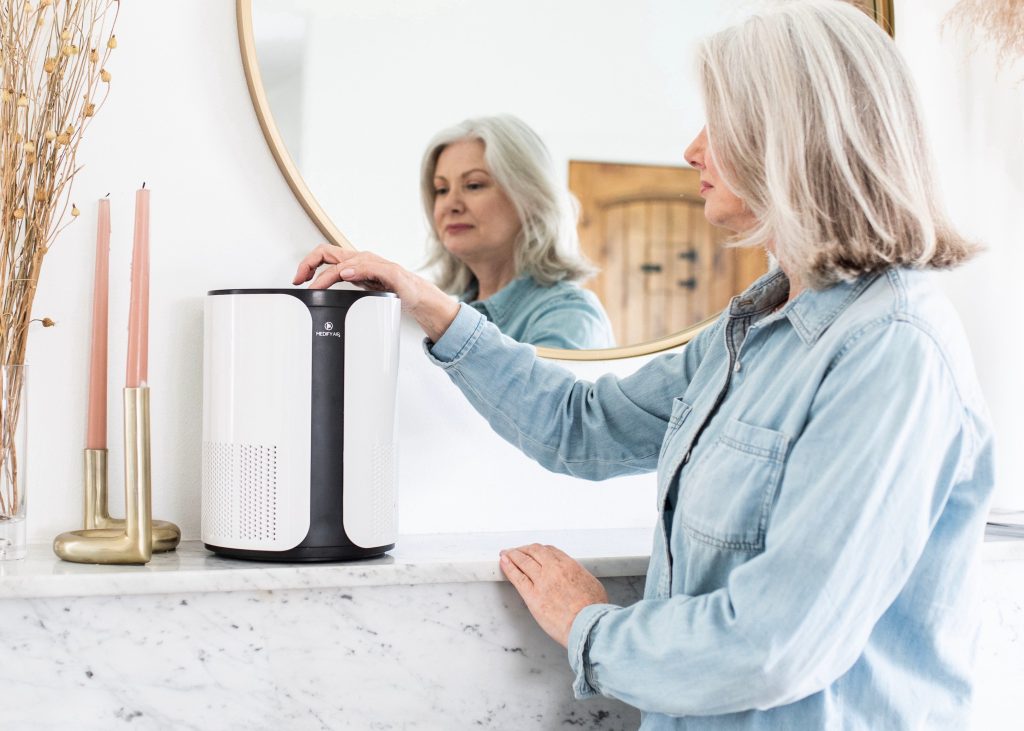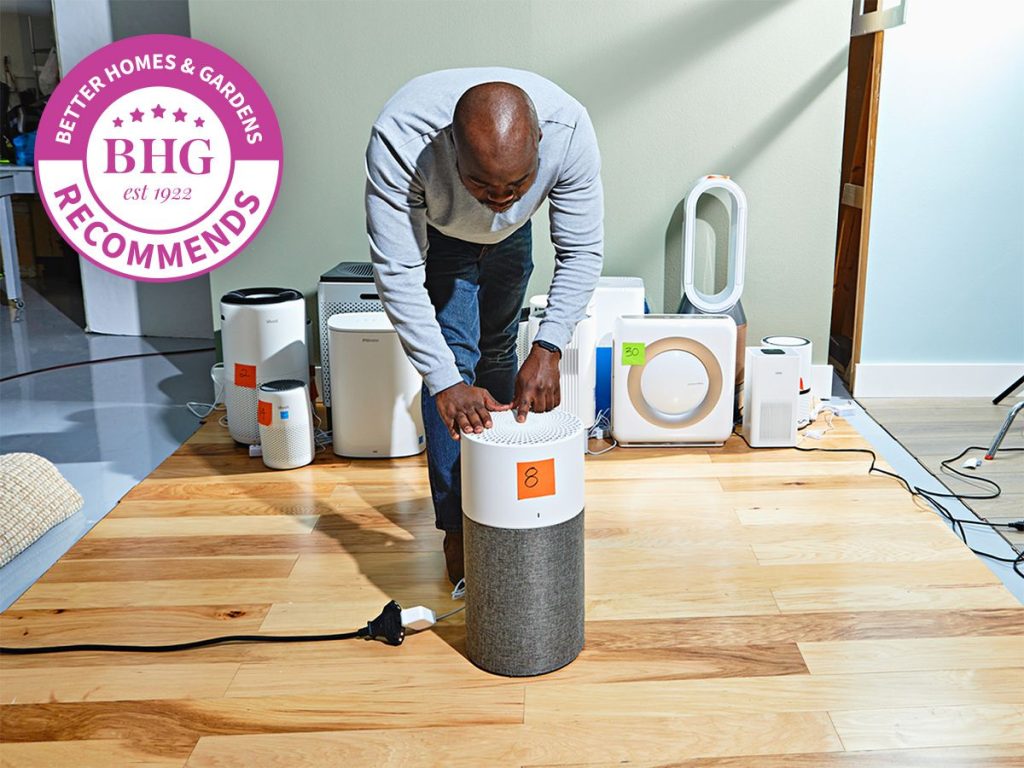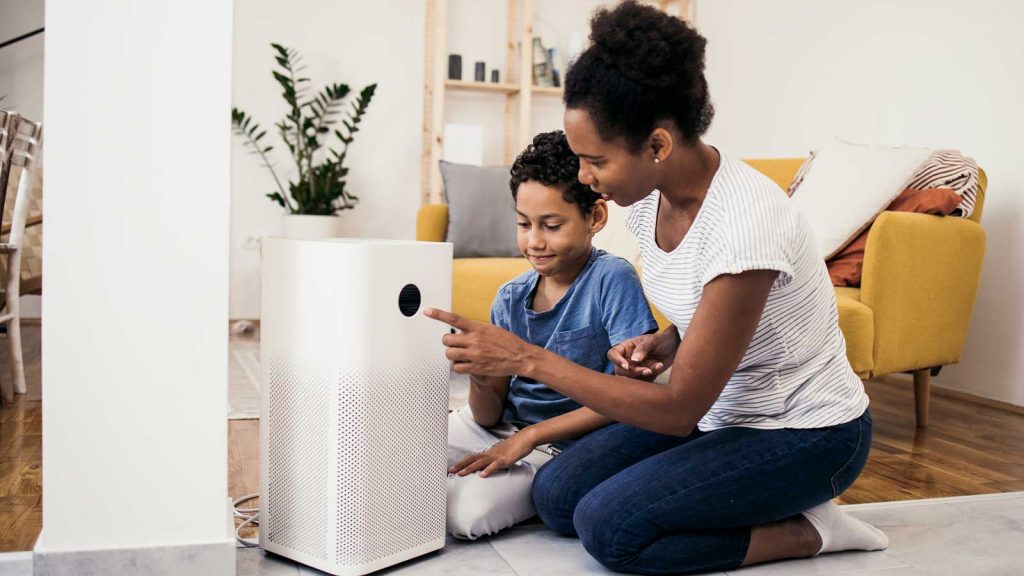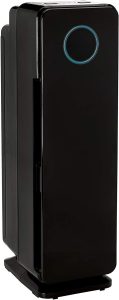You might be wondering if there are any particular air purifier suggestions to safeguard the health of older residents in your home. It is essential to provide a secure and comfortable environment for our senior loved ones in light of the aging population. In this article, we’ll examine the value of air purifiers in homes with senior residents and offer insightful advice on the specific characteristics to take into account when choosing an air purifier for their particular requirements. Learn how an air purifier can substantially enhance the health of older residents of your home and the quality of the air they breathe.

Importance of Air Purifiers
In order to improve the quality of the air we breathe within our houses, air purifiers are a need. They are essential for lowering indoor air pollution, fostering respiratory health, and improving general wellbeing. The quality of the air within a home can be considerably improved by purchasing an air purifier, especially for senior people who may be more susceptible to the effects of air pollution.
Reducing Indoor Air Pollution
A widespread problem that affects households all around the world is indoor air pollution. Dust, pet dander, mold spores, pollen, and volatile organic compounds (VOCs) released by household goods and chemicals are some of the causes. Particularly among the senior population, these contaminants can cause respiratory troubles, allergies, and other health concerns.
By successfully removing these dangerous particles from the air, air purifiers can lower indoor air pollution. Filters and other cutting-edge technology are used to trap and get rid of contaminants, making the air we breathe clean and healthy.
Promoting Respiratory Health
A crucial component of general health, especially for the aged, is respiratory health. As people get older, their respiratory systems are more vulnerable to allergies, asthma, and other chronic respiratory diseases like COPD and chronic obstructive pulmonary disease (COPD).
By eliminating indoor airborne allergens and contaminants, air purifiers can considerably better respiratory health. Elderly people can lower their risk of respiratory ailments and have better breathing, which improves their quality of life, by breathing clean, pollutant-free air.
Enhancing Overall Well-being
For respiratory health as well as general health, clean, fresh air is essential. The effects of poor indoor air quality can include irritation, migraines, weariness, and headaches. Elderly people can considerably benefit from the improved wellbeing that air purifiers provide because they may spend more time indoors.
Air purifiers make a home healthier and more comfortable for the elderly by removing allergens and pollutants. This enables them to go about their everyday lives without discomfort or the negative consequences brought on by dirty air. A more optimistic view on life, better sleep, and more vitality can all result from improved air quality.
Considerations for Air Purifiers in Homes with Elderly Individuals
There are a number of crucial aspects to take into account when choosing an air purifier for households with elderly residents. There are several factors to take into account, such as the different types of air purifiers that are available, the right size and coverage for the space, filtering efficiency, noise level, upkeep and filter replacement needs, and budgetary constraints.
Types of Air Purifiers
There are various types of air purifiers on the market, each with special characteristics and filtering systems of its own. HEPA air purifiers, activated carbon filters, UV-C light air purifiers, ionic air purifiers, and ozone generators are a few examples of typical types.
HEPA air purifiers are very good at removing allergens, dust, pollen, and pet dander that are as small as 0.3 microns. For houses with senior residents who may have respiratory issues, activated carbon filters help remove odors and VOCs. Air purifiers with UV-C light employ ultraviolet light to kill viruses and germs, adding an extra layer of defense against respiratory diseases. Negatively charged ions are produced by ionic air purifiers in order to neutralize airborne contaminants. On the other side, ozone generators release ozone molecules to get rid of odors and kill bacteria.
It is crucial to select an air purifier that best meets the needs and preferences of the elderly person, taking into account their unique demands and preferences.
Size and Coverage
For an air purifier to effectively clean the air, it is essential to choose the right size and coverage. It is crucial to take into account the size of the place where the air purifier will be utilized and make sure it has the ability to effectively clean the air there.
Measure the room’s length and width, then multiply those numbers to get the square footage to get an idea of the size. In order to choose an air purifier with the right coverage area, this will provide an estimate of the room size.
It’s also crucial to think about if the air purifier will be moved between different rooms or if it needs to be portable. This will define the air purifier’s size and mobility needs.
Filtration Efficiency
The effectiveness of the filtering process must be taken into account when choosing an air purifier. How well the purifier can capture and eliminate airborne contaminants from the indoor environment depends on how effective the filters are.
For houses with senior residents, HEPA (High-Efficiency Particulate Air) filters are strongly advised as one of the most effective types of filters. They ensure the removal of a variety of pollutants from the air since they can catch 99.97% of particles as small as 0.3 microns.
In addition to HEPA filters, some air purifiers also use pre-filters or electrostatic precipitators that can catch bigger particles before they enter the main filter, as well as activated carbon filters that assist remove odors and pollutants.
To guarantee the best possible air purification, it is crucial to take into account the kind and effectiveness of the filters when choosing an air purifier.
Noise Level
For senior people who may have a lesser tolerance for loud or frequent noises, the noise level of an air purifier can be a crucial consideration. It’s crucial to pick an air purifier that runs quietly to create a calm and relaxing environment.
The noise level specifications for many air purifiers are given in decibels (dB). For a quieter operation, look for purifiers with lower noise levels, especially below 50 dB. Additionally, take into account the older person’s particular tolerance for noise and select an air purifier that meets their requirements.
Maintenance and Filter Replacement
For an air purifier to operate at its best, proper upkeep and periodic filter change are crucial. In order to minimize any bother or inconvenience, it is crucial to pick an air purifier that allows for simple filter replacement.
Look for air purifiers with indications or notifications that let you know when the filters need to be changed. As a result, there is no degradation in the purifier’s ability to efficiently clean the air.
When choosing an air purifier, take into account the frequency and price of filter replacements since these can differ depending on the particular model. It’s crucial to pick an air purifier that works with your maintenance schedule and price range.
Budget Considerations
When choosing an air purifier, cost is a significant consideration. Considerations should be made for the purifier’s initial purchase price as well as any ongoing costs, such as electricity use and filter maintenance.
Establish a budget that takes into account your financial situation while giving the elderly person’s health and wellbeing top priority. Keep in mind that purchasing a high-quality air purifier can have a positive impact on your overall health, including your respiratory system.
Types of Air Purifiers
Understanding the various varieties, as well as their unique characteristics and advantages, is crucial when choosing an air purifier for a home with elderly residents. Listed below are a few popular types of air purifiers:
HEPA Air Purifiers
HEPA air purifiers are excellent in removing allergens, dust, pollen, and pet dander from the air because they are highly effective at capturing particles as small as 0.3 microns. To ensure that the air is pure and devoid of dangerous contaminants, they use a dense fiber filter to collect and hold these particles.
Professionals in the medical field advise using HEPA filters, which are among the best air filters on the market. For optimum performance, choose a HEPA air purifier that complies with HEPA requirements and has a high CADR (Clean Air Delivery Rate).
Activated Carbon Filters
Filters made of activated carbon are intended to remove chemical contaminants including smells and volatile organic compounds (VOCs) from the air. They have a highly porous carbon substance within that absorbs these impurities, reducing odors and enhancing indoor air quality.
Homes with senior residents who may be odor or respiratory sensitive can benefit the most from activated carbon filters. They are frequently used in conjunction with other filter types, such HEPA filters, to offer thorough air filtration.
UV-C Light Air Purifiers
UV-C light air purifiers kill bacteria, viruses, and other microbes in the air by shining ultraviolet light on them. Short-wavelength UV radiation from these purifiers damages the DNA of the microbes, preventing them from reproducing and ultimately leading to their demise.
An additional line of defense against respiratory infections is provided by UV-C light air purifiers, especially for elderly people who may already have compromised immune systems. It is crucial to remember that while air purifiers cannot collect substances like dust or allergies, other types of filters are frequently employed in addition to them.
Ionic Air Purifiers
Ionization is a method used by ionic air purifiers to remove airborne contaminants. They discharge negatively charged ions, which bind to positively charged particles and make them too heavy to remain in the atmosphere. These particles are then eliminated from the air by falling to the ground or sticking to objects.
Ionic air purifiers are renowned for their capacity to eliminate airborne contaminants, such as germs, dust, and allergies. Ozone production as a byproduct, however, can be a problem for people with respiratory sensitivity. It’s critical to pick an ionic air purifier that complies with safety requirements and emits less ozone.
Ozone Generators
Ozone generators are made specifically to get rid of odors and kill airborne bacteria. They release ozone molecules, which interact with odor-producing chemicals including smoke, pet scents, and culinary odors, and neutralize them.
Ozone generators can be useful for getting rid of odors, but they need to be used carefully and in well-ventilated areas. In particular, excessive quantities of ozone can be detrimental to respiratory health. To ensure the safety and wellbeing of elderly people, it is crucial to operate ozone generators properly and in accordance with the manufacturer’s instructions.
Size and Coverage
For an air purifier to effectively clean the air in a particular room or region, it is essential to determine the right size and coverage. The following factors should be taken into account when choosing an air purifier based on size and coverage:
Determining the Room Size
It’s crucial to estimate the size of the room where the air purifier will be used before making a decision. To determine the square footage of the room, multiply the length and width of the space.
A room that is 10 feet long and 12 feet wide, for instance, would be 120 square feet in size. The size and capacity of the air purifier required for that specific location will be determined with the aid of this measurement.
Matching the Purifier’s CADR with Room Size
The Clean Air Delivery Rate (CADR), which represents how effectively an air purifier can filter the air, is frequently used to rate air purifiers. Smoke, pollen, and dust are the three particle categories for which the CADR is typically given.
It is advised to choose an air purifier with a CADR that matches or exceeds the room’s square footage when making your selection. This guarantees that the air purifier can successfully clean the air in that area.
Consideration for Multiple Rooms
It is crucial to take portability and ease of movement into consideration if the air purifier will be utilized in multiple rooms. Look for purifiers with handles or wheels for traveling ease and that are lightweight.
As an alternative, think about placing many air purifiers in various rooms to ensure that the entire house has the best possible air quality. This makes it possible to clean specific areas and guarantees that each room receives the required amount of air purification.
Portability and Mobility
In addition to taking into account multiple rooms, it’s crucial to examine the air purifier’s mobility and portability needs. It is critical to pick a portable, lightweight model if the purifier needs to be carried around a lot or used in various locations.
Think about features like integrated handles, caster wheels, or a small footprint that can easily fit in various settings. This makes it possible for the air purifier to be easily relocated to the location where it is needed, ensuring that the elderly person always has access to clean, fresh air in their house.

Filtration Efficiency
When choosing an air purifier for a home with elderly residents, filtration efficiency is a crucial issue to take into account. When judging the filtration effectiveness of an air purifier, it’s important to understand and take into account the following factors:
Understanding HEPA Filters
High-Efficiency Particulate Air (HEPA) filters are very effective at catching and removing minute airborne particles. With a 99.97% efficiency, these filters can capture particles as thin as 0.3 microns. Typical indoor contaminants including dust mites, pollen, pet dander, and even some bacteria and viruses are included in this.
Consider models with HEPA filters when choosing an air purifier. Make that the purifier has been tested and verified by reliable organizations, and that it complies with HEPA requirements.
Additional Filtration Technologies
Although HEPA filters are quite effective, some air cleaners also use other filtration technologies to improve performance. Activated carbon filters, pre-filters, electrostatic precipitators, or photo catalytic oxidation filters are a few examples of these technologies.
Pre-filters or electrostatic precipitators can catch bigger particles before they enter the main filter, whilst activated carbon filters are made to remove smells and chemical contaminants from the air. Some air purifiers also use photo catalytic oxidation filters, which eliminate volatile organic compounds (VOCs) and other contaminants by combining UV-C light and a catalyst.
When choosing an air purifier, take into account the elderly person’s particular filtering requirements and preferences. Based on your clients’ respiratory sensitivity and the types of contaminants that are typically present in the indoor environment, search for models that feature extra filtration technologies.
CADR (Clean Air Delivery Rate)
A measure of how well an air purifier can clean the air in a particular room or area is called the Clean Air Delivery Rate (CADR). Smoke, pollen, and dust are the three particle categories for which the CADR is typically given.
Look for devices with higher CADR ratings when comparing air purifiers as these denote a more effective rate of air cleaning. A greater CADR guarantees that the air purifier can remove contaminants effectively, producing cleaner and fresher air in less time.
Choose an air purifier that meets or exceeds the square footage of the room where it will be utilized by comparing the CADR ratings of various models. This guarantees that the purifier has the ability to sufficiently clean the air in that specific area.
Noise Level
For senior people who may have a decreased tolerance for loud or frequent noises, the noise level of an air purifier might be a crucial factor. When determining an air purifier’s noise level, take the following in mind:
Quiet Operation for a Restful Environment
Numerous air purifiers are made to run softly, enabling a calm and restful environment. To ensure little disruption, look for purifiers that are particularly marked as “quiet” or “silent.”
The noise level standards for air purifiers are frequently given in decibels (dB). Look for devices with noise levels under 50 dB for a calmer experience because lower dB levels suggest quieter operation. Some cutting-edge versions also provide sleep mode options that further lower noise levels when in use at night.
Considering Noise Tolerance of Elderly Individuals
Elderly residents’ individual noise tolerance should be taken into account while choosing an air purifier for their house. Some elderly people might be more sensitive to noise or have trouble falling asleep in a noisy setting.
When selecting an air purifier, keep in mind the demands and preferences of the elderly person. Prioritize locating a purifier with a lower noise level if they have stated a desire for a peaceful environment or have a lower tolerance for noise.
Consider the air purifier’s noise level in relation to other background noises in the house as well. A higher noise level might be acceptable if the purifier will be utilized in a noisy setting. However, a lower noise level is advised if the purifier will be used at night or in a quiet room.

Maintenance and Filter Replacement
The best performance of an air purifier depends on proper upkeep and routine filter change. When determining an air purifier’s maintenance and filter replacement needs, take into account the following factors:
Ease of Filter Replacement
An air purifier’s efficiency must be maintained, which requires regular filter change. Consider the convenience of filter replacement when choosing a purifier and make sure it can be done without the aid of complicated procedures or trained personnel.
Look for air purifiers that have easy access to the filters and clear instructions. Some versions allow for tool-free filter replacement, making maintenance simple and quick. As a result, there will be no disruptions or inconveniences when maintaining the air purifier.
Indicator for Filter Replacement
Many air purifiers have indications or warnings that let consumers know when the filters need to be changed. These indicators frequently depend on filter sensor readings or usage time.
When choosing an air purifier, take filter replacement indicators into account. These indicators offer a practical approach to keep tabs on the filters’ lifespan and make sure they are changed when needed. The air purifier may continue to successfully clean the air without experiencing any performance degradation by changing the filters on schedule.
Schedule and Cost of Filter Replacements
It is crucial to take into account the frequency and cost of filter replacements when choosing an air purifier. The filter’s lifespan can change depending on the model and usage circumstances.
Choose air purifiers with filters that last longer so that you may change them less frequently and for less money. The price of new filters should be factored into the overall cost of owning the purifier.
Some manufacturers provide bulk replacement or filter subscription services, which can save expenses and guarantee that replacement filters are accessible when needed. Consider these elements while evaluating the air purifier’s overall maintenance needs and financial constraints.
Budget Considerations
When choosing an air purifier for a home with older residents, cost is a crucial factor. When evaluating the budgetary factors, keep the following in mind:
Initial Cost of the Air Purifier
One of the main budgetary considerations is the air purifier’s initial cost. According to their features, technology, and brand repute, air purifier prices vary.
Establish a budget that takes into account your financial resources while giving the elderly person’s health and wellbeing top priority. Along with the anticipated advantages and long-term value of the air purifier, take into account the individual’s particular wants and requirements.
Electricity and Energy Efficiency
In addition to the initial cost, it’s crucial to take the air purifier’s long-term energy usage and electricity bills into account. Look for models with minimal power usage and high energy efficiency.
Verify the purifier’s energy efficiency ratings, such as the ENERGY STAR label, which certifies that it adheres to stringent energy efficiency standards. Energy-efficient models can assist lower continuing electricity expenses and lessen the air purifier’s negative environmental effects.
Long-term Filter Replacement Cost
It is crucial to factor in the long-term expense of filter replacements when evaluating the budget. Depending on the particular type and usage circumstances, filters’ useful lives might vary, and the expense of replacements can mount over time.
For the air purifier under consideration, do some research on the availability and price of replacement filters. Look for versions that offer reasonably priced replacement filters, or subscription programs that offer savings or choices for large purchases. This makes sure the ongoing maintenance expenses stay within the budgeted amount.
Choosing an air purifier that matches the budget while offering the older person the best air purification is attainable by taking into account the initial cost, electricity consumption, and long-term filter replacement cost.

Additional Features to Consider
Additional features can improve the overall user experience and convenience when choosing an air purifier for a home with elderly residents. There are a few things to think about:
Air Quality Sensors
The air purifier has sensors that continuously check the quality of the air in the space. These sensors are called air quality sensors. To maintain the best indoor air quality, these sensors can recognize changes in the quality of the air and automatically modify the purifier’s settings.
Look for versions with sophisticated air quality sensors that show real-time readings of the air quality and alter the fan speed or operation mode accordingly. This guarantees that the air purifier reacts to changes in the quality of the air and provides effective cleaning as necessary.
Auto Mode and Smart Features
The air purifier can conveniently alter its settings in auto mode based on the air quality that is detected. The air purifier increases its fan speed to quickly clean the air when the air quality sensors detect low air quality. In contrast, the purifier slows down or runs at a lower fan speed to save energy when the air quality improves.
In addition to smart features like Wi-Fi connectivity and compatibility with smart home systems, some air purifiers offer these as well. These capabilities enhance convenience and flexibility by enabling users to remotely manage the purifier using a smartphone app or voice commands.
When evaluating these added features, take the elderly person’s particular requirements and preferences into account. To ensure that the air purifier can be simply managed and tailored to meet individual needs, look for models that offer simple controls and clear interfaces.
Remote Control and Wi-Fi Connectivity
The air purifier’s settings can be readily changed by users thanks to remote control features. For senior people who might have mobility issues or trouble getting to the purifier directly, this can be quite helpful.
Some air purifiers have Wi-Fi connectivity as well, enabling smartphone apps to be used for remote control. This offers increased convenience and ease of use by allowing users to monitor and operate the purifier from anywhere in the house.
When evaluating the Wi-Fi connectivity and remote control options, take the elderly person’s unique needs and preferences into account. To ensure simple and practical operation, pick an air purifier with user-friendly controls and a trustworthy remote or smartphone app.
Adjustable Fan Speeds and Programmed Timer
Users may adjust the airflow and noise level of the air purifier thanks to the adjustable fan speeds. Elderly people who may have particular fan speed or noise tolerance preferences may find this to be especially helpful.
Look for air purifiers that include a range of fan speeds, including a low-speed setting for overnight operation that is silent. This guarantees that the purifier can be adjusted to a cozy and unique level based on personal demands.
Another useful feature that enables customers to arrange the air purifier’s operation is the timer functionality. Elderly people can program the air purifier to turn on or off at particular intervals, ensuring continual air cleaning or preserving energy at predetermined hours.
When evaluating these added features, take the elderly person’s particular requirements and preferences into account. Select an air purifier with programmable settings for the best possible comfort and convenience.
Professional Recommendations
It can be helpful to ask for professional recommendations and assistance when choosing an air purifier for a home with senior residents. Consider some of the sources listed below:
Consulting with HVAC Professionals
Professionals in HVAC (Heating, Ventilation, and Air Conditioning) are knowledgeable about indoor air quality and can offer helpful advice and recommendations for choosing the best air purifier. They can evaluate the unique requirements and wants of the elderly person and offer specialized advice based on their knowledge.
Consult a dependable HVAC expert who can assess the quality of the indoor air and suggest an appropriate air purifier depending on the unique conditions and worries of the elderly person.
Considering Recommendations from Medical Experts
When choosing an air purifier for a person with a particular respiratory disease or sensitivity, medical professionals such as doctors or allergists can offer insightful advice. They can evaluate the elderly person’s unique medical requirements and provide advice on the best air purifying features and technology.
Think about speaking with a doctor who specializes in aging-related illnesses or respiratory health. They can offer suggestions that take into account the elderly person’s particular health issues and general wellbeing.
Seeking Assistance from Geriatric Care Specialists
Experts in the care and wellbeing of the elderly are known as geriatric care specialists. They can offer advice and suggestions for choosing an air purifier that meets the particular requirements and preferences of elderly people.
Consider contacting a geriatric care specialist or caretaker who can evaluate the elderly person’s unique needs and make recommendations based on their expertise and understanding.
It is possible to make an informed choice and choose an air purifier that solves the unique needs and priorities of the elderly person by asking for professional guidance.
In conclusion, choosing an air purifier for a home with senior citizens necessitates cautious thought. You can make an informed choice if you are aware of how essential air purifiers are for lowering indoor air pollution, encouraging respiratory health, and improving general wellbeing.
Take into account the various air purifier types that are available, the right size and coverage for the space, filtering effectiveness, noise level, maintenance and filter replacement requirements, and budgetary factors. To make the best choice of an air purifier that satisfies the elderly person’s unique needs and preferences, consider the extra features that can improve the user experience overall and seek professional advice.
An air purifier purchase can significantly improve indoor air quality, support better respiratory health, and increase general well-being in a home with older residents. Make sure the older person has a clean, safe, and comfortable living place by taking the required precautions.

Recommendations: Air Purifiers for Home Large Room up to 1000 Ft

